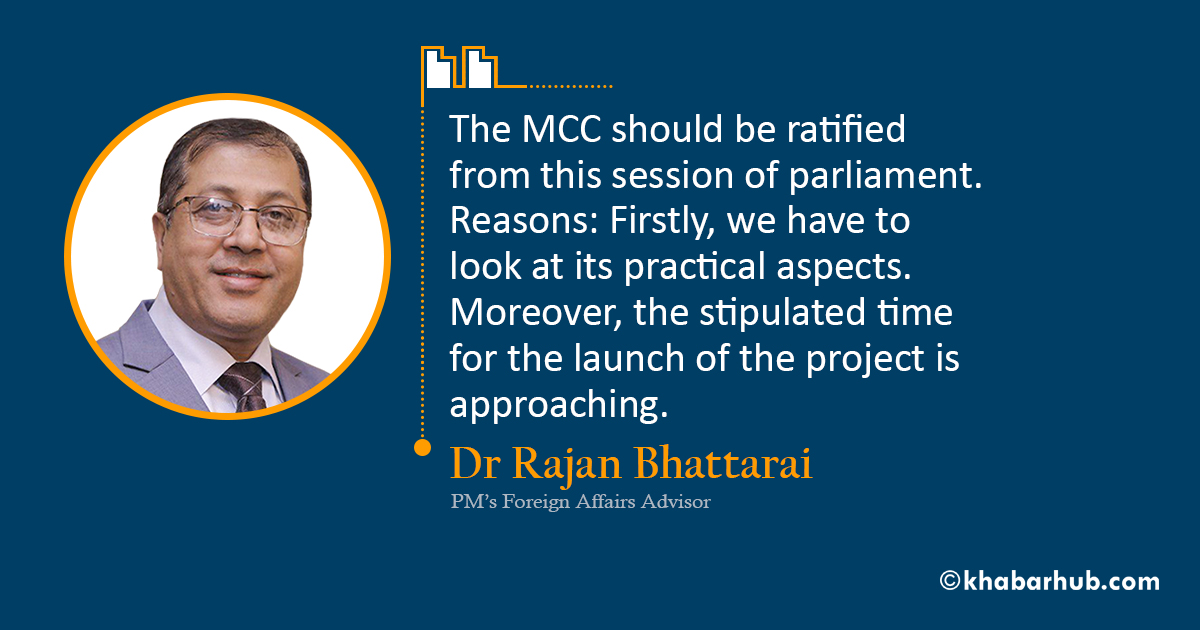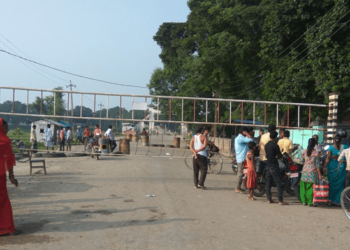Dr. Rajan Bhattari, the Foreign Affairs Adviser of the Prime Minister of Nepal and a Young leader of the ruling Nepal Communist Party, is known for clarity and straightforwardness in the issues.
Here are the excerpts of the talk Khabarhaub had had with Dr. Bhattarai on various issues related with Millennium Challenge Corporation, IPS, Kalapani and current affairs:
The Millennium Challenge Corporation grant initiated during former Prime Minister Sher Bahadur Deuba’s time and furthered ahead by the succeeding government has been made a matter of dispute. What’s the problem with MCC and what’s it actually?
Let me go to the background of MCC. The USA adopted a distinct policy of providing a grant to the developing and underdeveloped countries in 2004. It concluded that to address its broader interest in foreign policy serve, it should invest in the infrastructure development of such countries.
To facilitate the selection process, they set certain criteria. They told that Nepal met those criteria in 2011. The major indicators were fulfilled in Nepal, so, Nepal became eligible for such grants. Then, Nepal initiated the move for the grant.
The agreement was made in 2017. All the governments from 2011 to 2017 consented and forwarded the grant. Then, during Sher Bahadur Deuba’s Premiership, it was signed by Gyanendra Bahadur Karki, the Finance Minister then in Oct. 2017.
This is a strict time-bound project we have agreed upon. MCC officials also are aware of the sensitiveness of such a deadline. They also agree that only after the background preparation is complete, the countdown should start.
After completion of the long procedure of negotiation, it was signed in 2017. Then the deadlines were fixed for the implementation of the agreement.
Why was the implementation delayed?
The implementation was delayed for various reasons, especially the lack of enough preparations on Nepal’s side. The preparations I talked about were like setting an office, getting some staff for that, forming a team under the chair of the Finance Ministry of Nepal.
The team was supposed to coordinate with the US counterpart related to MCC to facilitate the implementation of the program. Another cause was related to the documents we had to prepare. One of the conditions they have put was it has to be ratified from the parliament.
We think it good as once the project starts, owing to the poor record of meeting deadlines in megaprojects, we have to meet the deadline. The failure could not only deprive us of the possible advantages but also cause us a larger risk of paying back the loss.
Generally, such grants are consented by the cabinet and it’s enough. It’s not much practical to get every grant ratified by the parliament. However, now it is done, once the agreement is made we should abide by it.
In the last session of parliament, the provision about to be met. The discussion had reached the conclusion that as the process was stalled for some time, the new deadline has to be fixed to ease the situation. Once the project starts, the most important aspect of it, especially for the country like ours, is, it has to be completed within 5 years.
This is a strict time-bound project we have agreed upon. MCC officials also are aware of the sensitiveness of such a deadline. They also agree that only after the background preparation is complete, the countdown should start.
We think it good as once the project starts, owing to the poor record of meeting deadlines in megaprojects, we have to meet the deadline. The failure could not only deprive us of the possible advantages but also cause us a larger risk of paying back the loss.
Some people have linked it with one wing of the Indo-Pacific Strategy (IPS). It is turning an issue for discussion among the intellects here. NCP has been trying to portrait itself as patriot and nationalist. What do you say about it?
What I want to say is, in the issues relating to patriotism and nationality the incumbent Prime Minister needs not get any further verification. He has stood his best in various, though very tough, situations before.
Regarding the clarification about IPS. A few weeks before, while I was in Washington, I met with the top officials including President Trump’s advisor, West Asia and South Asia Desk head of the State Department.
Their version and the version coming from US Ambassador to Nepal has been clarifying to date is the same. They said that IPS is a strategic policy only under conceptual form yet.
Has the issue taken an institutional shape?
This has not taken any institutional or alliance form yet. It is an attempt on how to make a common concept about the countries lying in the Indo-Pacific region. They have been saying they have tried to bring the whole region under one concept, i.e. IPS.
The basic concept under it is all the countries under Indo-Pacific should be safe. They should be open. Let there be more democratic countries. This serves the interest of American foreign policy. This not an organization or alliance of any form.
They said they have not made any military strategy linking American interest and Security alone though as it is the grant to be provided by the US government it is likely to include many things the US values high. They have made it clear that they have not got any other conditions.
Indo Pacific, according to their definition, starts from India and it goes up to the Pacific Ocean or Pacific countries that go, to some extent, up to the Latin American countries. Europe and Africa do not come under it. But MCC is not confined to Indo-Pacific countries alone. This is the first thing to prove that it is not the main agenda of IPS.
They have never said that if you want this grant you should join our alliance. Our interpretation is the same as well.
If this is the case, what is the status of Nepal’s current foreign policy at the moment?
Now, on this issue, we are very clear about our foreign policy. Our foreign policy is based on the principles of non-alignment, the UN Charter, and Panchasheel.
Even before Panchasheel, non-alignment and the UN Charter came into existence, our foreign policy had been abiding by similar principles. Since long we stick to the belief that we won’t let our land be used against any other nation.
If you go through Dibya-upadesh of Prithvi Narayan Shah, you will find similar fundamental principles mentioned there. We won’t adopt any policy showing deviation from such fundamental principles.
IPS to date, esp. till the date I was briefed on the issue, is not a military alliance or an alliance seeking our deviation from the fundamental policies and principles our foreign policy has been guided by so far. I
don’t believe it will harm us at any point. The next thing to consider is, the MCC grant promised to us is not the type of grant confined to the nations that lie in Indo-Pacific criteria. The US has provided nearly 50 countries including African, American and Asian.
Indo Pacific, according to their definition, starts from India and it goes up to the Pacific Ocean or Pacific countries that go, to some extent, up to the Latin American countries. Europe and Africa do not come under it. But MCC is not confined to Indo-Pacific countries alone. This is the first thing to prove that it is not the main agenda of IPS.
Secondly, we should remember that we will be legally binding on the conditions/situations prevalent at the time of the agreement, i.e. we are legally binding on the conditions prevalent until the date we inked the agreement viz. Oct. 2017.
The US Officials are free to interpret as they like, however, if we consider the version of authentic persons, the persons designated to speak on the issue or execute the issue, they have not spoken anything contradictory to the conditions in the agreement.
Is it that the US authorities have not put forth any pre-condition?
They have not said that they want some more conditions as per their IPS policies to be included in the agreement. If they come with it, then we have to think differently. Till then, we have to be guided by the spirit of the agreement and the conditions mentioned in the Compact at the time of the agreement. We are an independent and sovereign country if they try to bind and demand revision against the spirit of the core principles of our foreign policy we should and we will go for defying the proposal.
However, unless the Compact is dubbed differently and we are asked to abide by the changes they make, we should not and cannot step back from the agreement.
Few more concerns have come to surface regarding the implementation of this Compact. Firstly, if any prevailing local law contradicts with this compact, the conditions of the Compact shall supersede the local law. Actually, in all such mega projects, it is a universal practice. Let’s look at it practically, let’s assume we signed an agreement and we changed the domestic laws as our parliament can change the domestic law.
Prior to signing the agreement, we should ensure that the compact is not against our constitution or spirit of the constitution; provided anything contradicts our constitution we should change the Compact not the spirit of the constitution. Provided the Compact, at the time of pinning it as agreement, is as per our Constitution and we sign.
To ward off the complications that may arise provided the domestic laws are changed afterward, such conditions as letting the international pacts or in this case, the Compact prevails over the domestic laws. It is an international practice as well. So, any objections or reservations made on this ground make no sense at all. If anyone opposes it, it is generally due to the ignorance of international practice in such issues.
I think we should not dispute over other issues on it. We are also a part of the agreement. We should not change our version of the issue we signed two years ago. We should ratify it instantly and make room for a smooth implementation of it. As there are no provisions harming us, it’s in our best interest to let the project complete in the designated time.
None has any objection to the extension of the transmission line, neither has anyone said that road maintenance is not in our interest. All conditions of the compact are binding only to the issues related to the accomplishment of the project. So there is no need to panic about it.
Let’s make it this way:
i. let’s abide by the conditions mentioned in the compact as it is or was at the time of the agreement.
ii. Provided they alter the condition and make it against our national interest, let’s say no. Otherwise, let the project go ahead, as it will be over in 5 years. With the successful implementation of the project, we will have a massive achievement. We have to go this way.
Is this session of Parliament going to ratify MCC Compact then?
We should ratify it from this session of parliament. There are a few reasons for it: firstly, we have to look at its practical aspect. The time set for the project launch is coming near. The delay in ratification will waste the time that could best be utilized for the successful implementation of the project.
Next, as a preparation for the project implementation, the MCC- Nepal’s office is already set up. The staff required are recruited. They are getting a salary now. The office bearers have started their tasks like a consultation with various stakeholders. In this situation, bringing the issues not related to the agreement we should not create a fuss about the project and we should not delay the launching of the project.
Provided the US officials demand us change the agreement and go as per their wish, very clearly and boldly, we should say we cannot go ahead with it. On no other ground, we should reject or go hesitant on such matters. If we pull ourselves back from the grant, we will lose our credibility; I think, we should not lose our credibility.
Now two more things on the issue: the standing committee seems to be divided on the MCC issue, and there is a division in the Secretariat as well and the group holding the belief that MCC should be passed is in minority there. What is it actually?
There may some rumors like that outside. But, I believe, our secretariat has got much-matured leaders in it. There are 4 Prime Ministers: 1 incumbent and 3 more ex-Prime Ministers. Everyone there is in one time or the next has been in the cabinet and hence, are known for their wise judgment. They will surely decide considering all factors related to it.
We are the ruling party: our performance appraisal is being the concern of the international community. We should not do anything that’s harmful to our country. The nation should never lose anything. Our nationality, our patriotism, our sovereignty is our very sensitive issue.
We should take and have been taking nationality as the issue of our pride. People believe only NCP can do it and we should not let people’s faith shattered. However, we should be careful that any of our decision should not smear our character both at the national and international levels. As in other cases, the leadership will surely show maturity in such cases.
Lately, some people have started saying that Nepal is likely to be the sandbox for foreign interests; sometimes for North or South or the Westerners. Do you feel the same?
In my opinion, it’s natural for various sources to try to influence. We have to be strong and clear about our national interests. The possibility of being a sandbox for various forces hints at the strategic momentum the nation is getting. We have become a part of global politics.
Owing to the geopolitical location of our country, we lie between rising powers. In this situation, we have got the immense opportunity of making the best of their potential; China’s rapid development and growing influence, India’s rising up and expansion of influence and role in international politics bring more opportunities than challenges if we manage to handle it.
Our success in balancing ourselves and taking the best of them can take us up sustainably; however, an error in judgment might bang us to ground badly. That’s why in such cases we should not err.
In such a situation, making it an agenda for domestic politics or linking the foreign policy with petty interests in the party create dire consequences in the long term. I humbly request the leadership that we should not make such issues the point for a bargain in the party, we should put the nation and national interest first in such issues.
We have adopted a quite an apt and balanced foreign policy in the last few years. So, we are getting historical opportunities to change the fate of the country. We should not miss it. ‘Friendship with all, enmity with none,’ the pillar of our foreign policy should be utilized at its best.
Lastly, what about Kalapani?
We are very clear on the Kalapani issue. A task force formed under K.P. Oli when prior to coming to Premiership, had come with the proof of the fact that there was Nepali Post in Kalapani. We have been raising our issue since then. As the latest development in the issue, we have got national consensus on the Kalapani issue. Firmly, we should take it forward. We have a national consensus on two points:
- The river lying west of Limpiyadhura is the source of the origin of the Mahakali River. As the origin of the Mahakali river is Kali River, and the Kali River lying west of Mahakali is the border river.
- The dispute on this issue should be resolved through diplomatic channels and through dialogue.
The PM has already spoken formally on this issue. The government has forwarded its response through both formal and informal channels. This is our biggest asset. In case of the border dispute, in that also the dispute related to the Indian Army’s encroachment by making army post in our land, everyone expects quick settlement of the issue. But, such matters take little more time than general expectations.
We are striving hard to resolve all channels, all track 2, track 3, etc. They have also agreed that it should be settled through dialogue. Our Eminent Person’s Group (EPG) has also included the issue and has suggested to settle it as early as possible. We have to stick to the issue and lead it to the natural and logical conclusion establishing our ownership on that part.









Comment